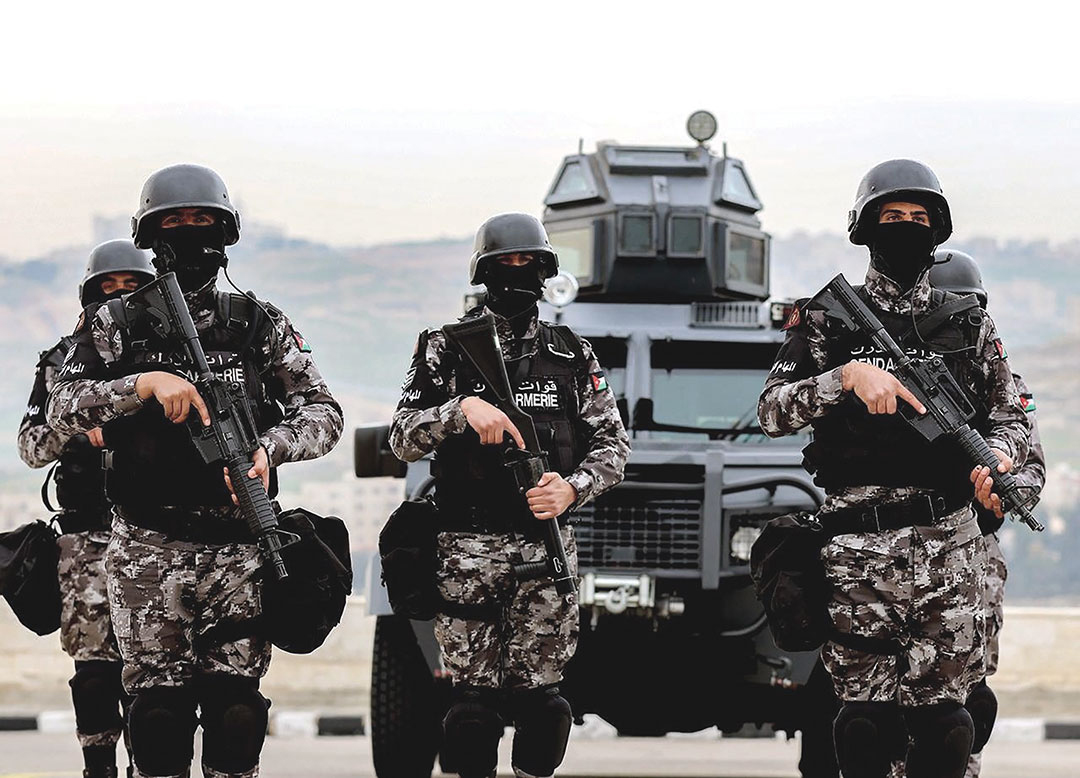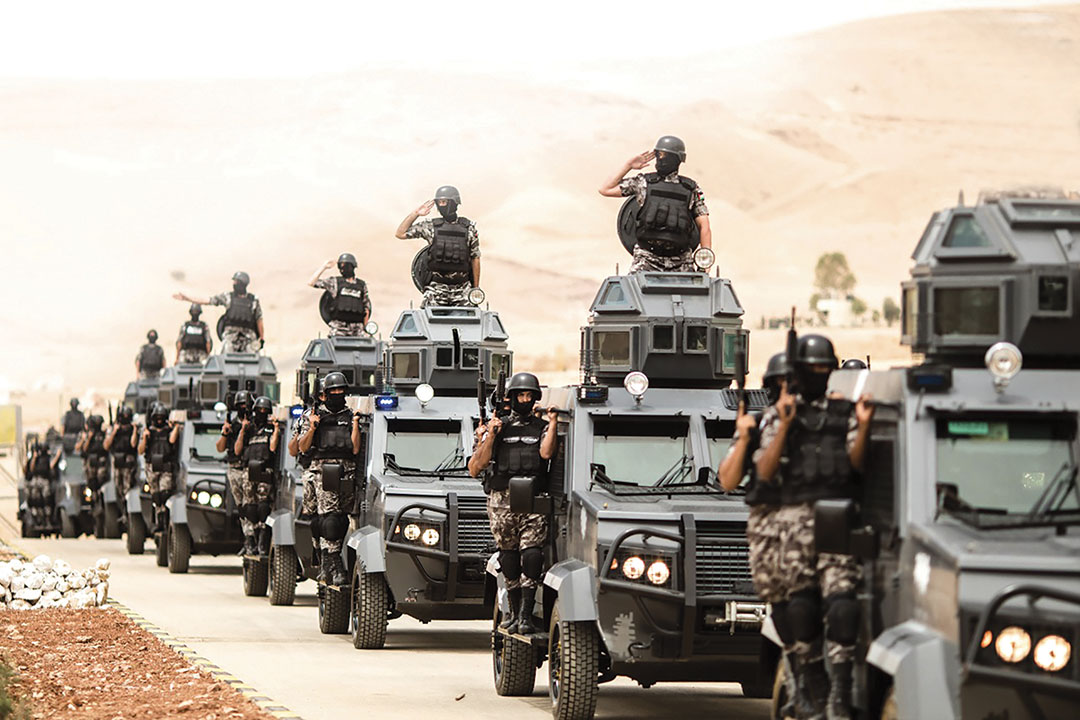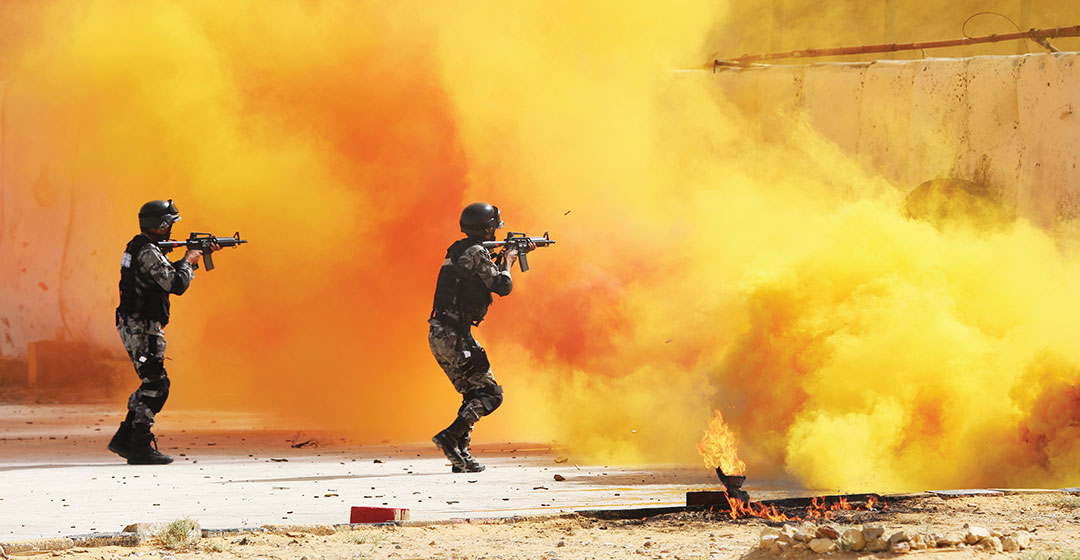The Jordanian Gendarmerie Forces play a vital role in the kingdom’s counterterrorism operations
UNIPATH STAFF | Photos by JORDANIAN GENDARMERIE DIRECTORATE
There is no doubt that the regional security apparatus is preoccupied by the security challenges presented by terrorist activities and plots to undermine stability and civil tranquility. After the Iraqi city of Mosul fell into the clutches of Daesh terrorist thugs, security forces began to change their classic counterterrorism tactics, training instead for combat in densely populated areas and preparing for unconventional operations against groups using civilians as human shields, setting off bombs inside families’ homes and taking hostages.
In this context, the Hashemite Kingdom of Jordan is among the countries racing to open an international joint counterterrorism training program with the United States. The program stemmed from cooperation between the Jordanian Gendarmerie Forces and the American Anti-Terrorism Assistance Program (ATA). The Jordanian Gendarmerie Training Academy was chosen to host this program at a site equipped with the most updated technology to allow for the most modern tactics in counterterrorism operations training.
Unipath interviewed the director of the Gendarmerie Forces, Staff Maj. Gen. Hussein Al-Hawatmeh, about the importance of this program.
Unipath: What is the purpose of this joint counterterrorism training program?

Maj. Gen. AL-Hawatmeh: Over the past few years, Jordan has made brave efforts in the fight against terrorists, who reject mercy and tolerance and instead manipulate beliefs and ideas. We have gone to the greatest possible lengths to combat the kharijite gangs and deprive the terrorists of resources. This is our war, which we are conducting to defend our future and values; we fight with all of our allies to defend humanity. Jordan has made many sacrifices to preserve its long-standing values in this area, and its military, security and strategic branches have made tremendous efforts and performed professionally in cooperation and coordination with its partners.
Cooperation in this area between the Hashemite Kingdom of Jordan and the U.S. is part of a long-standing partnership reinforced by the political efforts of His Majesty King Abdullah II bin Al Hussein, the commander in chief of the Jordan Armed Forces, who has called for the union of multiple countries’ counterterrorism efforts into an international, holistic movement. He seeks unity and coordination of security efforts among allies and partners in this area because no country is immune from the dangers of terrorism or able to confront it in isolation from the regional and international context.
It was only natural that the Jordanian-American partnership in this area would expand to include issues related to training. The launch of this carefully planned joint program between the Jordanian Gendarmerie and the ATA took two years and several months before both sides’ shared aspirations could be met. We chose the current training site because it meets our requirements, including expansive fields and modern buildings. Both groups conducted extensive studies over two years to ensure the site yielded the desired results. The U.S. government and the ATA provided modern equipment, built a modern indoor firing range, and constructed training rooms to simulate realistic counterterrorism operations. Classrooms are better equipped and dormitories are outfitted comfortably to provide an environment conducive to learning.
Unipath: What is the capacity of the training center?
Maj. Gen. AL-Hawatmeh: The center and training program has a capacity of 120 at any one time to maintain high training standards and provide high-quality services to trainees. This figure will double the training capacity of the Jordanian security apparatus in the counterterrorism field.
Unipath: How did you coordinate the opening of this critical strategic space with the Gendarmerie Forces?
Maj. Gen. AL-Hawatmeh: Mutual trust between Jordan and the U.S. and their long history of cooperation in this field created the basis for launching this project. As for the Gendarmerie Forces, they are a professional security force, organized along military lines, intended to specialize in certain areas. The Gendarmerie was restructured in 2008 under the guidance of King Abdullah and has made extensive strides in advancing its security capabilities. It has played a major role in strengthening law enforcement, tackling crime and combating terrorism. It has also played a leading role in the world through active participation in international peacekeeping forces. The Jordanian Gendarmerie Forces are one of the biggest contributors to international peacekeeping forces, participating in formed police units in numerous conflict zones under the auspices of the United Nations. Our Soldiers have learned international best practices, enhanced their skills at working with others, and gained a greater understanding of security concerns in the field of joint operations under a variety of conditions.
As such, the Jordanian Gendarmerie Forces today enjoy a distinguished domestic and international reputation for professionalism in carrying out security duties in Jordan and peacekeeping missions internationally. When the need arose to launch a high-quality training program for counterterrorism operations, the Gendarmerie and the ATA were the appropriate options for a partnership, as both had a long history in the field of counterterrorism, distinguished staff at multiple levels, and the ability to enrich this partnership.

Unipath: Why were the Gendarmerie Forces restructured after 2008?
Maj. Gen. AL-Hawatmeh: The Jordanian Gendarmerie Forces date back to the founding of the kingdom in 1921. It was active until 1956, when Jordanian Public Security was established and entrusted with the task of maintaining security in Jordan. The Gendarmerie gradually disappeared from the country’s security work until 2008, when His Majesty King Abdullah issued directives to restructure the force into the current, modernized form.
His Majesty had a forward-looking approach to the future, especially in light of the development of Jordanian society and the increasing security needs. During changes in the security environment in subsequent years, this force gained a positive reputation by addressing security concerns with a great deal of commitment, discipline, professionalism and respect for human rights. The Middle East has witnessed vast security and political developments, but thankfully, due to the wisdom of His Majesty, Jordan has remained immune to these changes. The Gendarmerie is an active security force that deals with citizens fairly and professionally, providing security for property, safety and infrastructure. We can say that the Gendarmerie Forces has fully adhered to the principles and values of the Hashemite Kingdom of Jordan by honoring human welfare.
His Majesty the commander in chief has been able to lead the country with great wisdom during a precarious phase. Jordan has shown the world that humanity’s values can sometimes be stronger than the traditional military machine to settle civil unrest, but that the presence of a security force capable of enforcing the rule of law remains essential to daily life and the attainment of rights. Building on that point, Jordan’s security and stability — despite what may be happening in the region — is based on several foundations, the most important of which are wise and confident leadership, a powerful yet disciplined security apparatus, and Jordanians’ deep sense of patriotism.
Unipath: What are the goals of the joint
counterterrorism program?
Maj. Gen. AL-Hawatmeh: To increase our capacity to train members of security forces in Jordan and allied countries in the latest methods and tactics of counterterrorism. This is an extension of our determination to curb and eradicate evil through work and coordination with our allies. Our doors are open to security personnel from all friendly and allied countries, and we expect that these security personnel will come to acquire our expertise and skills. Our high-quality training center, the kingdom’s safe, stable environment and high training standards are all attractive qualities of our center.
Unipath: What do you think about the partnership with the U.S.?
Maj. Gen. AL-Hawatmeh: The understanding between Jordan and the U.S. has led to a long-standing strategic counterterrorism partnership. This partnership embodies our shared interests, values and objectives in combating the threats of extremism, violence and terrorism. This center is one of the fruits of this long-standing partnership; we may see other projects in the future. The existence of these joint, specialized and high-level training centers is evidence of the depth of the partnership between institutions in both countries — such as the Gendarmerie and the ATA — that work to combat extremism.

Unipath: Do the Gendarmerie Forces participate in the Eager Lion exercise?
Maj. Gen. AL-Hawatmeh: We have participated in the Eager Lion training through our rapid-response units, which participated in a scenario of the security exercise that simulated a chemical attack. The rapid-response units of the Gendarmerie played a major role in this exercise by surrounding the site of the attack and coordinating with other forces to rescue casualties and prohibit civilians from entering the restricted area. The rapid-response units in the Gendarmerie have received specialized training, are equipped with modern equipment, and are capable of addressing a wide range of security contingencies. These units are characterized by having multiple posts throughout the kingdom, their ability to respond quickly to crises, and their familiarity with arrest and cordon operations during critical and dangerous security operations.
Unipath: How do you distinguish your counterterrorism responsibilities from those of the Armed Forces?
Maj. Gen. AL-Hawatmeh: In Jordan, we have an integrated security system based on coordination and harmony among all military and security institutions. The Gendarmerie is the liaison between the Armed Forces and the Public Security Directorate (PSD). In regular security incidents, the PSD is the first responder; it answers 911 calls or any other emergency call that reaches the security apparatus. When we receive intelligence about a serious security incident, such as riots or hostage-taking, the Gendarmerie is called in because we specialize in handling demonstrations, rallies and dangerous people. If the PSD is dealing with an incident that has gotten out of control, it will contact the Gendarmerie, which will support the PSD’s efforts. If there is sufficient intelligence available, we may even attempt to take action before any incident occurs.
As for geographical coverage, the Gendarmerie has rapid-response units stationed in all governorates of the kingdom. In the counterterrorism realm, the Gendarmerie has a unit specializing in counterterrorism operations. Members undergo intensive training, and the Gendarmerie is one of the most effective counterterrorism units in the world. It deals with all counterterrorism issues other than hijackings and airport security, for which there are specialized units in the Jordan Armed Forces. Other than those issues, the Gendarmerie is the first responder to any terrorist act in the kingdom — God forbid.
Defense of national borders remains the responsibility of the Jordan Armed Forces, which possess substantial and sophisticated defense capabilities. There is constant communication and continuous partnership between the Armed Forces and the security services in Jordan, including the Gendarmerie, whether in training, security operations or strategic planning.

